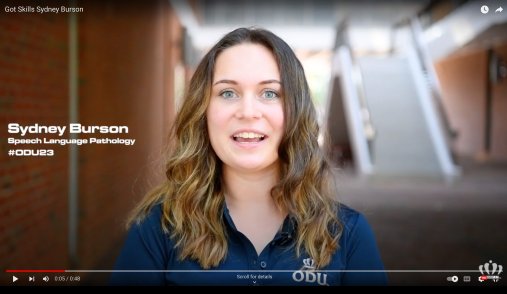ODU wants all students to understand the career skills they have gained and how to transfer them onto a resume and into a career.
Got Skills?
Skills development is an important part of goal achievement, whether the goal is employment, graduate school or other personal life destinations. Students gain a tremendous amount of skills and experience through classwork, campus involvement, volunteer work, internships and on campus jobs.
Top Ten Skills
-
Ability to analyze quantitative data
-
Technical knowledge of the job
-
Proficiency with computer software programs
-
Ability to create and/or edit written reports
-
Ability to sell or influence others
-
Ability to work in a team structure
-
Ability to analyze quantitative data
-
Technical knowledge of the job
-
Proficiency with computer software programs
-
Ability to create and/or edit written reports
-
Ability to sell or influence others
-
Ability to work in a team structure
Develop Skills in College
Here are some things you can do to increase or develop your skills while you're a student:
Being leader of a club or an intramural sports team or organizing a volunteer project will show that you've learned to make decisions and solve problems. Participating in extracurricular activities while maintaining a high GPA also will demonstrate that you have the "ability to plan, organize, and prioritize work."
Good grades show that you have a good knowledge base—the "technical knowledge related to the job"—and demonstrates a strong work ethic—a quality that employers value.
Another way to demonstrate your knowledge of the job is to have done an internship or two in your field. You'll have taken an opportunity to look at your future career close up while getting hands-on experience with any potential job. Your internship can put your "foot in the door" to a job opportunity with many employers and help you build a network of professionals in your field.
The career center staff can help you go a long way in preparation for selling yourself to future employers. In addition to helping you choose a major and career direction, a career counselor can help you find internships, perfect your cover letter and resume, and develop your interviewing skills. Good interview skills will help you show a potential employer know that you can "verbally communicate" with people inside and outside the organization.
Courtesy of the National Association of Colleges and Employers
Build your skills in many ways
Why Skills Matter
-
Knowing your skills helps you build confidence and make better decisions
-
Understanding your skills helps you select a career that's the best fit for you
-
Applying your skills in work and leisure leads to greater satisfaction and fulfillment
-
Analyzing skills that need development helps you pick necessary courses and activities
-
Articulating your skills makes you more competitive in the job market
-
Integrating skills into the workplace leads to greater success
-
Evaluating gaps and adapting to change helps you seek development and further learning
Take Your Skills to the Next Level
Learn the “Top 10” skills employers look for, and how you can gain those skills while you're in college.




